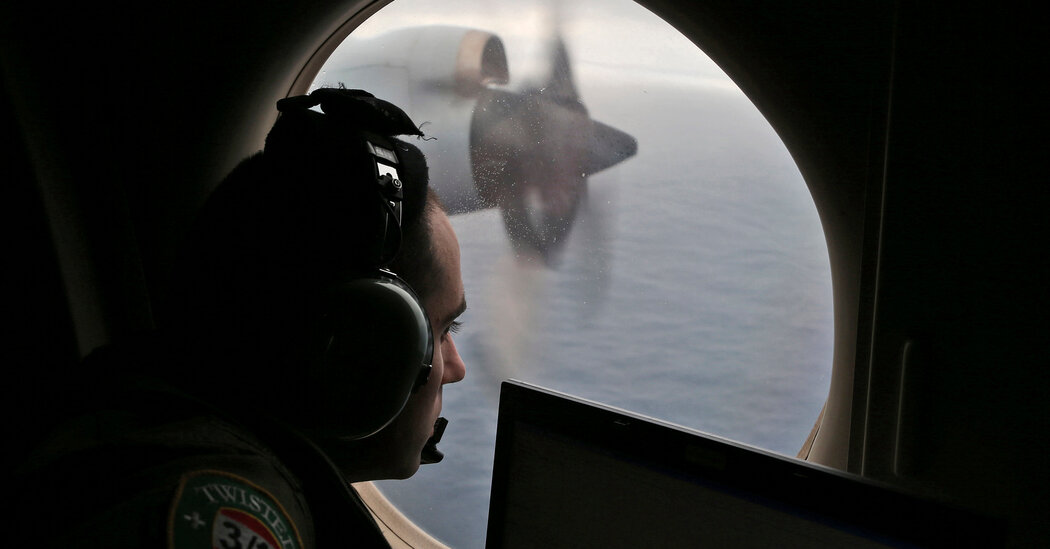On March 8, 2014, Malaysia Airlines Flight 370 was heading from Kuala Lumpur, the Malaysian capital, to Beijing, when it deviated from its scheduled path, turning west across the Malay Peninsula.
The plane, a Boeing 777 carrying 239 people from 15 countries, is believed to have veered off course and flown south for several hours after radar contact was lost. Some officials believe it may have crashed somewhere in the southern Indian Ocean after running out of fuel, but expansive search efforts over years have returned no answers, no victims, and no plane.
The reason the plane went off course and its exact location today remains one of the greatest aviation mysteries of all time. This week, officials suggested a renewed search operation might be undertaken.
Here’s a brief look at what we know about the plane’s disappearance 10 years later.
Investigators searched by air and sea.
The first phase of the search lasted 52 days and was conducted largely from the air, covering 1.7 million square miles and involving 334 search flights.
In January 2017, the governments of Australia, Malaysia and China officially called off the underwater search for the plane after combing more than 46,000 square miles of the Indian Ocean floor. That effort cost $150 million.
The following January, the Malaysian government began another search in partnership with Ocean Infinity after receiving pressure from families of the missing passengers and crew. After a few months, the search effort led by Ocean Infinity ended, having found no evidence of the plane’s whereabouts.
Was any debris ever found?
While a wrecked plane was never found, about 20 pieces of debris believed to be from the plane were located along the coasts of the African mainland and on the islands of Madagascar, Mauritius, Réunion and Rodrigues.
In summer 2015, investigators determined that a large object that washed up on the shore of Réunion, a French island in the Indian Ocean, was a flaperon that had come from a Boeing 777, making it likely that it was debris from Flight 370.
Another piece of debris, a triangular piece of fiberglass composite and aluminum with the words “No Step” written on its side, was found in February 2016 on an uninhabited sandbank along the coast of Mozambique.
Then, the Australian government confirmed in September 2016 that a wing flap that had washed onto a Tanzanian island was from Flight 370. The Australian Transport Safety Bureau matched its identifying numbers to those of the missing Boeing 777.
What are the theories around the plane’s disappearance?
There are a multitude of theories, ranging from the bizarre to the provocative, about what caused the plane to disappear. In fact, there are too many to name here. The lack of information about what happened to the flight led the public and investigators in several directions.
Some officials believe that the plane ran out of fuel, and one theory holds that the pilots tried to make an emergency landing at sea. Others suggest that one or both pilots lost control of the aircraft, that one was a rogue pilot, or that the plane was hijacked.
What did the official government report say?
After more than four years of searches and investigations, a 495-page report released in 2018 gave no conclusive answers as to the fate of the airliner. The lack of concrete answers devastated families of the victims, who had been hoping for some closure.
Kok Soo Chon, the head of the safety investigation team, said the available evidence — including the plane’s manual deviation from its flight course and the switching off of a transponder — “irresistibly point” to “unlawful interference,” which might suggest the plane was hijacked. But there was no evidence of who might have interfered, or why.
The report also closely examined all passengers and the pilot, Zaharie Ahmad Shah, and the first officer, Fariq Abdul Hamid. The report looked into the men’s financial statuses, health, tone of voice on radio communications and even their gait as they walked to work that day. No abnormalities were detected.
What happens next?
Now, a decade after the plane’s disappearance with no concrete answers or plane found, a new search could soon be underway.
Malaysian officials said in a statement this week that the government was ready to discuss a new search operation after being approached by Ocean Infinity.
Oliver Plunkett, the chief executive of Ocean Infinity, said in a statement that the company was now in a position to search again about six years after its previous effort returned no answers.
“This search is arguably the most challenging, and indeed pertinent one out there,” he said. “We’ve been working with many experts, some outside of Ocean Infinity, to continue analyzing the data in the hope of narrowing the search area down to one in which success becomes potentially achievable.”



